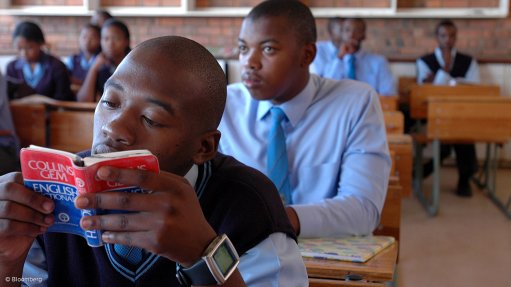
Photo by: Bloomberg
A report released this week by Pali Lehola, South Africa’s Statistician General, shows that fewer than one in five skilled workers in South Africa is black. This despite 20 years of democracy and comprehensive affirmative action and employment equity policies being put in place. Everybody whose job it is to prepare young people for the world of work should be called to account.
Schools, universities, colleges and employers must all shoulder the blame for this failure to develop the country’s greatest resource – its people – and we must all take accountability for ensuring that this statistic changes in the next few years.
The report highlights the youth unemployment rate of 36.1% and the low percentage of skilled black workers, which stands at 17.9%.
The solutions to this alarming statistic are obvious and we, along with 200+ business, political and social leaders, debated them at a conference last week which was hosted by Yellowwoods, MISTRA and the National Planning Commission, on Accelerating Youth Employment. Specifically, we highlighted the need to fix the primary and secondary education systems and ensure that tertiary education becomes more closely aligned with the skills demand so that education meets the needs of the market. These suggestions point to the need for urgent collaboration to address the quality of education and align tertiary education to emerging market needs.
The more pressing question, however, is this: what about the current generation of young people whose education and social circumstances prevent them from accessing the job market and whose education eliminates them from securing employment, especially skilled employment?
At the Harambee Youth Employment Accelerator, we have over the past three years, developed solutions to overcome these barriers. Our key learning and the one we have worked painstakingly to change in the employer mind-set is that education is not the only proxy for success at work. Of far greater benefit for getting young people into work is understanding their potential in relation to the job. By focusing on an individual’s fluid intelligence, i.e., their learning potential, we are able to understand the extent to which a young person can acquire new knowledge, think conceptually and solve problems independently. These are the key skills required in the work environment. With them, anything can be achieved.
We all know that if the opportunities to learn have been poor then the derived competencies – such as numerical ability and literacy - are poor. But South Africa’s employers need to recognise that this doesn’t mean we can ignore the young people affected by poor education. We need to focus instead on learning potential rather than specific competencies when evaluating young people for jobs.
Harambee’s experience is clear. By using fluid intelligence as a key measure of ability we have widened the available pool of employable young people. The net result is the good news in the face of the Statistician General’s bad news: over 80 South African employers, spanning seven sectors, have hired 10,000 young people from the Harambee work-readiness programme into full time employment, ultimately making a greater improvement to youth unemployment in the market than any other organisation has done to date.
Issued by Harambee